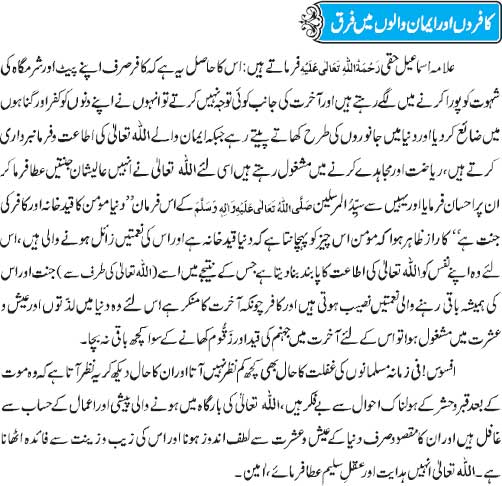
Water For Ablution
Q. What sorts of water are good for Ablution (Wudu)?
A. Ablution (Wudu) and Bath (Gnusl) are allowed with rain water; spring or well’s water; stream, river/sea water; melted snow; hail-water; water in a large pond, or a big tank.
Q. Which are the liquids not allowed for Ablution (Wudu)?
A. The following liquids are not allowed for Ablution:
Fruit juice; squeezed sap (fluids of plants & trees); soup; such viscous water whose color, smell, and taste have changed due to its blending with any permissible thing. Water in small quantity in which some impermissible thing has dropped, or some animal has drowned and died in it; water that has already been used for Ablution or Bath. Also, such water which is largely polluted; water from which forbidden (Haram) animals have drunk, and water distilled from aniseed, rose, or any other herb.
Q. What term is used for the water which has already been used for Ablution or Bath (Wudu & Ghusl)?
A. Such water is called ‘used-up-water’ (Musta’mil). I1: is clean by itself, but is not permissible for re-using it for Ablution, or Bath. BISMIL-LAHIR-RAHAL4RIR-RAHIM (In the name of ALLAH, the Beneficent, the Merciful)
Durood Shareef Kay Ahkam
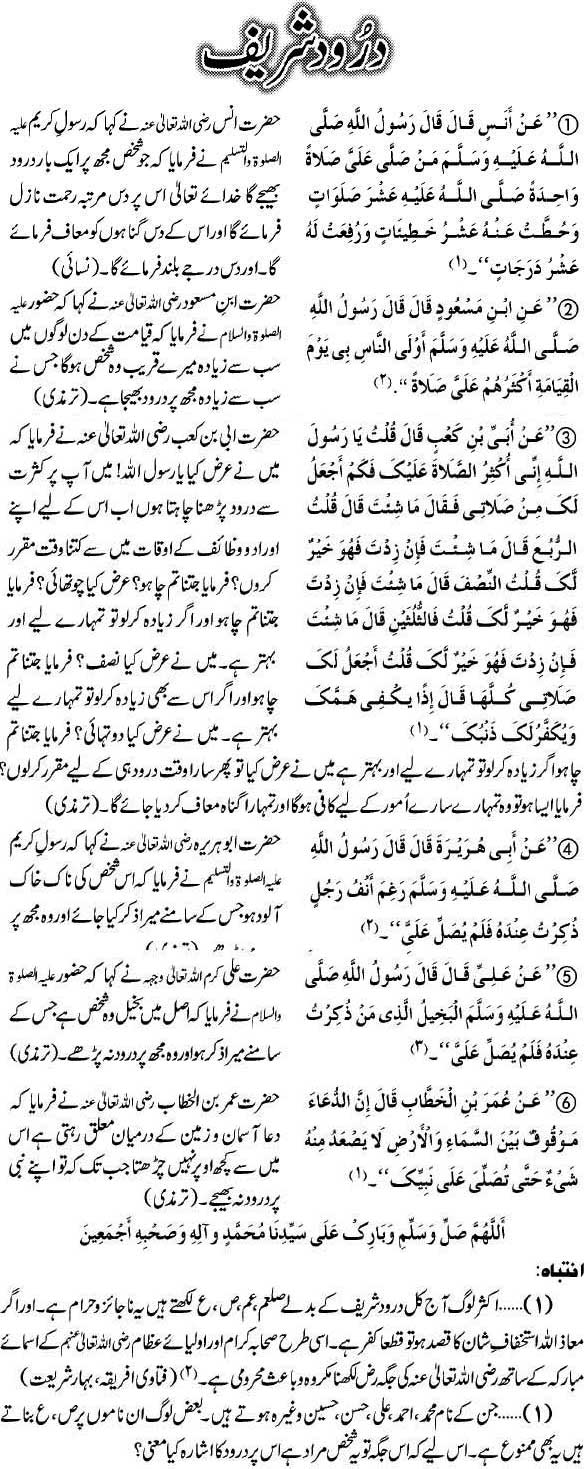
Istinja: Cleaning Private Parts After Urination and Excretion
Allah says in Holy Quran (9:109):”…..therein, where there are men who love to purify themselves. Allah Loves the pure…”
This verse was revealed in which Allah is praising the people of Quba who were accustomed to using both stones and water after calls of nature
Q. What is meant by Istinja?
A. Istinja means the removal of dirt that is left on the body after the call of nature: such as urine, or faeces.
Q. How to perform Istinja after urination?
A. After passing urine, its drops should be dried with clean mud, and then washed with water.
Q. How to perform Istinja after excreting faeces?
A. After discharging faeces, the unclean area should be wiped with three or five pieces of mud. Then wash the body with clean water.
Q. What is the importance of Istinja?
A. Istinja is desirable (Mustahab) if excrement or urine has not smeared the private parts. Istinja is Sunnah (Masnun) if the dirt spreads around, but covers less than, or equal to a ‘Dirham’ in area. But if the dirt covers space of over one ‘Dirham’, it is obligatory (Fard) to perform Istinja.
Q. Which substances may be used for Istinja?
A. Clean mud or pieces of stone can be used for this purpose. ( note: If there are no proper facilities for the disposal of mud and pebble-like, instead only water must be used alternatively use toilet paper before applying water
Q. Which substances are undesirable (Makruh) for performing Istinja?
A. It is undesirable (Makruh) to perform Istinja with: bones dung; horse dung; edibles; coal; pieces of cloth and paper. (toilet paper may be used)
Q. Which hand should be used to perform Istinja?
A. The left hand should be used. It is undesirable (Makruh) to use the right hand.
Q. What things are undesirable (Makruh) in Istinja?
A. It is undesirable to do the Istinja: (I) Facing the Qiblah, or sitting with one’s back in that direction. (2) At a place where parts of the body that must remain covered from others (Satr) are exposed to others.
Q. What things are undesirable (Makruh) while urinating, or passing stool?
A.
- Urinating or passing stool in a position with the Qiblah in front or at the back.
- It is undesirable (Makruh) to pass urine or stool at a place where the ‘Satr’ is exposed to one’s view.
- Urinating in a standing position.
- Urinating or passing stool in a pond, canal, or well.
- Urinating or passing stool at the bank of a canal, pond etc.
- Urinating or passing stool near the wall of a mosque.
- Urinating or passing stool in a graveyard.
- Urinating into a rat’s hole or any other hole in the ground.
- Talking, while urinating or passing stool.
- Aiming the urine, from a lower place towards a higher surface.
- Urinating or passing stool at a public resort or pathway.
- Urinating or passing stool at a place which is meant for Ablution or bath.
Isalm Ki Nazar Mein Rishtedari Ki Ahmiyat
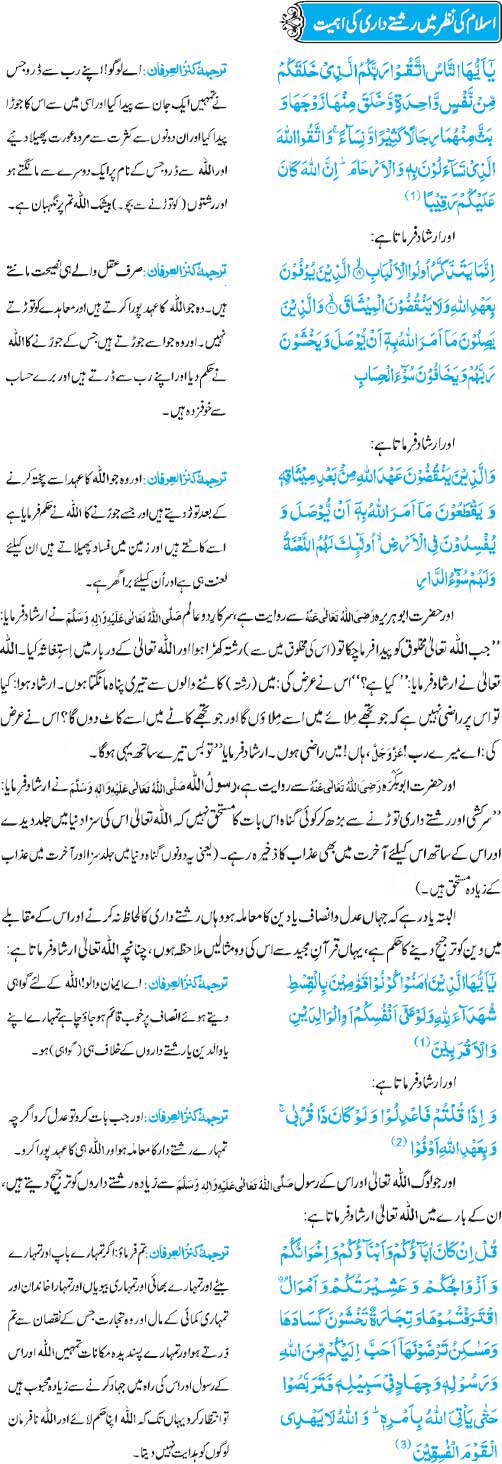
Some Issues Regarding Ghusl
Q. Which Baths are Sunnah, and what are their names?
A. These are four, namely:
- Bath for Friday prayers.
- Bath for the prayers of the two ‘Eids’.
- Bath before wearing ‘IHRAM’ (cloth especially worn by the Hajj pilgrims).
- Bath at ARAFAT for the stay there (Waquf).
- At the time of conversion to Islam
- Washing a dead body
Q. Which, and how many Baths are ‘Desirable’ (Mustahab)?
A. These are quite many. However, a few of them are:
- Bath on the night of the 15th of the month of Sha’ban (known as Shab-e-Bar’at).
- Bath on the night of ‘Arafa’ i.e. the night following the evening of the 8th of Zil-Hiijah.
- Bath for the prayer of the Solar and Lunar Eclipse.
- Bath for the prayer of Istisqa (Salat-ul-Istisqa), which is a prayer for begging rains from Allah.
- Bath before entering the holy cities of Makkah and Madinah.
- Bath of a person who has given a bath to the dead, and
- Bath of a disbeliever, after embracing Islam.
Q. If there is the necessity for a Bath (Ghusl), and one stands in rain; or dives into the river, water flowing all over the body, would that fulfill the conditions of having a Bath?
A. Yes, provided that one also rinses the mouth, and passes water into the nostrils.
Q. Is it permissible to face the Qiblah while bathing?
A. It is not allowed to face the Qiblah when one is naked. There is no harm, however, if the ‘Satr’ is covered. (Satr means such parts of one’s body which must remain covered, according to Shariah).
Q. How is it to bathe with the Satr, uncovered?
A. it is permissible to bathe naked in the bathroom, or at any other secluded place, where one’s Satr is not exposed.
Q. What are the undesirable acts (Makruhat) in a Bath?
A. These are:
- Consuming a lot of water i.e. unnecessary wastage.
- Talking during Bath with the Satr uncovered.
- Facing the Qiblah and;
- Bathing against Sunnah of the Holy Prophet (Peace be upon him).
Q. If ablution (Wudu) is not performed before the Bath, is it necessary to do so for prayer, after taking the Bath?
A. Bath covers ablution, as well. Therefore, no ablution is necessary after the bath.
Visible uncleanliness NAJAASAT HAQIQIY-YAH:
Q. How many kinds of gross defilement [Najaasat Haqiqiya-yah (Visible dirt)] are there?
A. There are two kinds of gross defilement (Najaasat Haqiqiyyah): One is Najaasat-a-Ghaleeza and the other, Najaasat-a-Khafeefa
Q. What are: Najaasat-a-Ghaleeza, and Najaasat-a-Khafeefa?
A. (a) Gross defilements are called Najaasat Ghaleeza; (b) Light uncleanliness is called Najaasat-a-Khafeefa.
Q. How many things fall under the category of gross defilement (Najaasat-a-Ghaleeza)?
A. Urine feces of humans, excretion of animals, urine of forbidden (Haram) animals, the flowing blood of man and animals, and wine and droppings of chicken and ducks, fall under the category of gross defilement (Najaasat-a-Ghaleeza).
Q. What things fall under the category of Light Uncleanliness (Najaasat-a-Khafeefa)?
A. Urine of permissible (Halal) animals and the droppings of forbidden (Haram) birds are all Light Uncleanliness (Najaasat-a-Khafeefa).
Q. To what extent gross defilement (Najaasat-a-Ghaleeza) is excusable?
A. If the gross defilement is thick like excrement, its maximum extent of three grams is excusable. If it is in liquid forms, such as wine, or urine, then it is excusable if the area covered is not more than that of an English one-rupee coin. To be excusable it means that the prayers offered with such defilements on the body or the clothes will be valid, though undesirable. Not removing, deliberately, even such an extent of defilement, is not allowed.
Q. How much light defilement (Najusat a-Khafeefa) is excusable?
A. It is excusable when it covers less than a quarter of a garment or less than one-fourth of any particular part of the body.
Q. How to clean the body or a garment from gross defilement (Najaasat-a-Haqiqiyyah)?
A. Gross defilement (Najaasat-a-Haqiqiyyah), whether it be gross defilement (Najaasat–a-Ghaliza) or (Najaasat-a-Khafeefa) i.e. light uncleanliness on the body, or a garment, can be removed by washing three times. The clothes must also be squeezed, all three times.
Q. Can defilement be cleaned just by the water, or also by something else?
A. Yes, by all thin fluids such as Vinegar; or watermelon juice. These are good enough to wash gross defilement (Najaasat-a-Haqiqiyyah)
Tahajjud, Ishraq, Chasht Aur Awabeen Ki Namaz
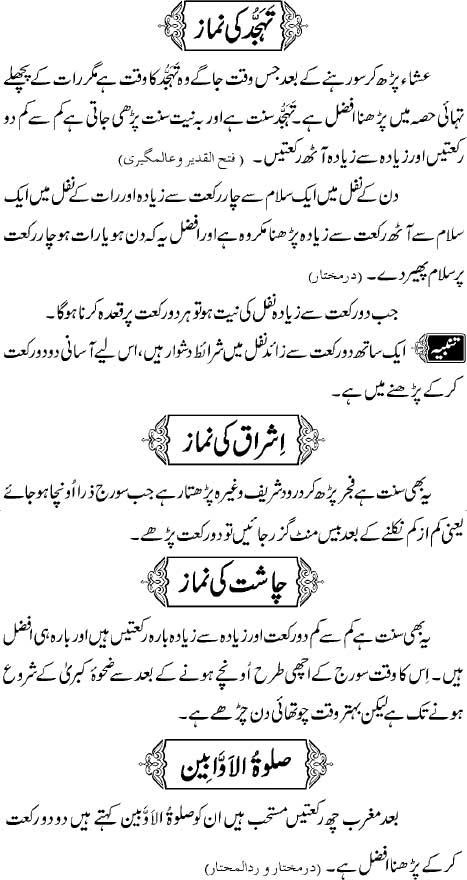
The Bath (Ghusl)
The major Uncleanliness (Najaasat-eHukmiyaah i.e. Hadas-e-Akbar and Janabat) can only be removed from the body by washing the entire body (bath) as known as (ghusl).
Three kinds of ghusl:
- Obligatory (Fard)
- Sunnah
- Desirable (Mustahab)
Fard Ghusl (Ghusl has to be done in these circumstances):
- Discharge of semen in any circumstances
- Sexual intercourse
- Menses (Hajdh)
- Blood discharge after childbirth (Nifaas)
In-state of janaabat the following actions are prohibited
- Salaat (Prayers of any type)
- Touching the Holy Quran
- Reciting the Holy Quran
- To enter a Masjid (mosque)
- To make Tawaaf of Ka’bah
Method Of Ghusl:
- Wash hands up to the wrists.
- Clean the private parts also known as Istinja and remove the major Uncleanliness, if any, from the body.
Perform Ablution (Wudu). - Pour some water and rub the whole body. Pour water again over the whole body, three times. Then rinse the mouth and sniff water into the nostrils.
Faraid Of Ghusl:
- Rinsing the mouth.
- Sniffing water into the nostrils.
- Pouring water over the whole body so no single part of the body remained dry including hairs.
Sunnan Of Ghusl:
- Washing both hands up to the wrists.
- Washing the private parts and such areas which are not clean.
- Having the intention (Niyah) to remove the uncleanliness.
- Pouring the water thrice, on the whole body.
Dua Mein Khushu Aur Khudhu

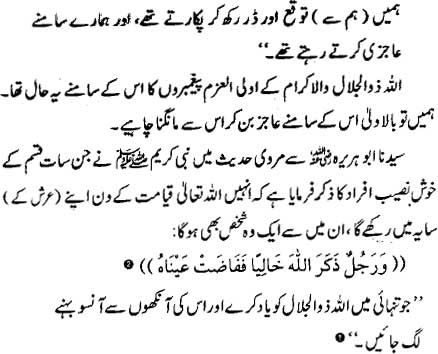
Rules About ‘Invalidators’ Of Ablution
Q. What quantity of an unclean discharge from the body invalidates the ablution?
A. If any small quantity of an unclean fluid, (blood/pus) discharges from the body and flows towards that part of the body whose washing is essential in bath or ablution, will breach the ablution.
Q. Does any blood which remains within the eye, invalidate the ablution?
A. No. It is because washing the inner portion of the eye is not commanded in ablution, or in the bath.
Q. If blood trickles out of a wound, time and again, and is wiped off each time with a finger or a piece of cloth, would that invalidate the ablution?
A. It must be judged whether the blood would have flowed, had it not been wiped. If it would have flowed, then the ablution breaks; otherwise, it remains intact
Q. What things, when vomited, nullify the ablution?
A. If a mouthful of bile; blood; food, or water is thrown out, the ablution is breached. If only phlegm is thrown out, the ablution is not invalidated.
Q. What, if one vomits again and again but in little quantity each time?
A. The ablution is breached if one nausea causes several vomits whose total discharge equals a mouthful. However, suppose nausea results in vomiting a small quantity which brings relief, and thereafter one nauseates a second time to vomit a small quantity again. In that case, the discharge of these two separate episodes will not be added (to see they equal a mouthful), and the ablution will remain intact.
Q. If blood or pus, oozing out of a boil on any part of the body, stains the clothing, will that dress be considered clean, or unclean?
A. If the blood or pus is so little that it cannot flow from the wound, the clothing will be considered as clean. However, it is better to wash it.
Q. Is the vomit, which is less than a mouthful, unclean (Napak)?
A. No. It is not.
Q. Will ablution be invalidated if a leech clings to one’s body, and sucks blood to its fill; or, a bug or a mosquito bites a person?
A. The sucking of blood by a leech will breach the ablution even if no blood flows from the wound after freeing the body from it. The blood would have certainly oozed down the body had it not been sucked by the leech. Ablution, however, will be valid in the case of a mosquito, or a bug bite, because blood sucked by these insects is quite small, and cannot flow.
Q. What type of sleep does not invalidate the ablution?
A. Sleeping in a standing position, or while sitting without any support, or in any posture adopted in the prayer, such as Sijdah, or a Qa’dah, does not break the ablution.
Q. Is such a person whose ablution does not break even by falling asleep?
A. Yes, ablution of the prophets of Allah does not break even if they fall asleep. This was their special privilege and superiority.
Q. Does bursting into laughter during prayers, break the ablution of all? If so what is meant by ‘bursting into laughter?
A. Bursting into laughter means: Laughing in such a loud way that it is heard by the others who are nearby.
The following are the conditions that invalidate ablution during the prayer:
- The person laughing aloud is an adult man or a woman. (Minor’s laughter does not break the ablution).
- The person who laughs must be awake. If a person falls asleep during prayer and then bursts into laughter, his ablution will remain intact.
- If one laughs in prayer requires bowing (Ruku), or prostration (Sujud). Thus, if one laughs in a funeral prayer, the ablution would not break.
Q. Is ablution nullified if one sees the private part/s of any other person’s body, that must remain hidden (Satr)?
A. No. The ablution remains valid, if one looks at the private part/s of one’s oven, or another person’s body, intentionally or unintentionally.

